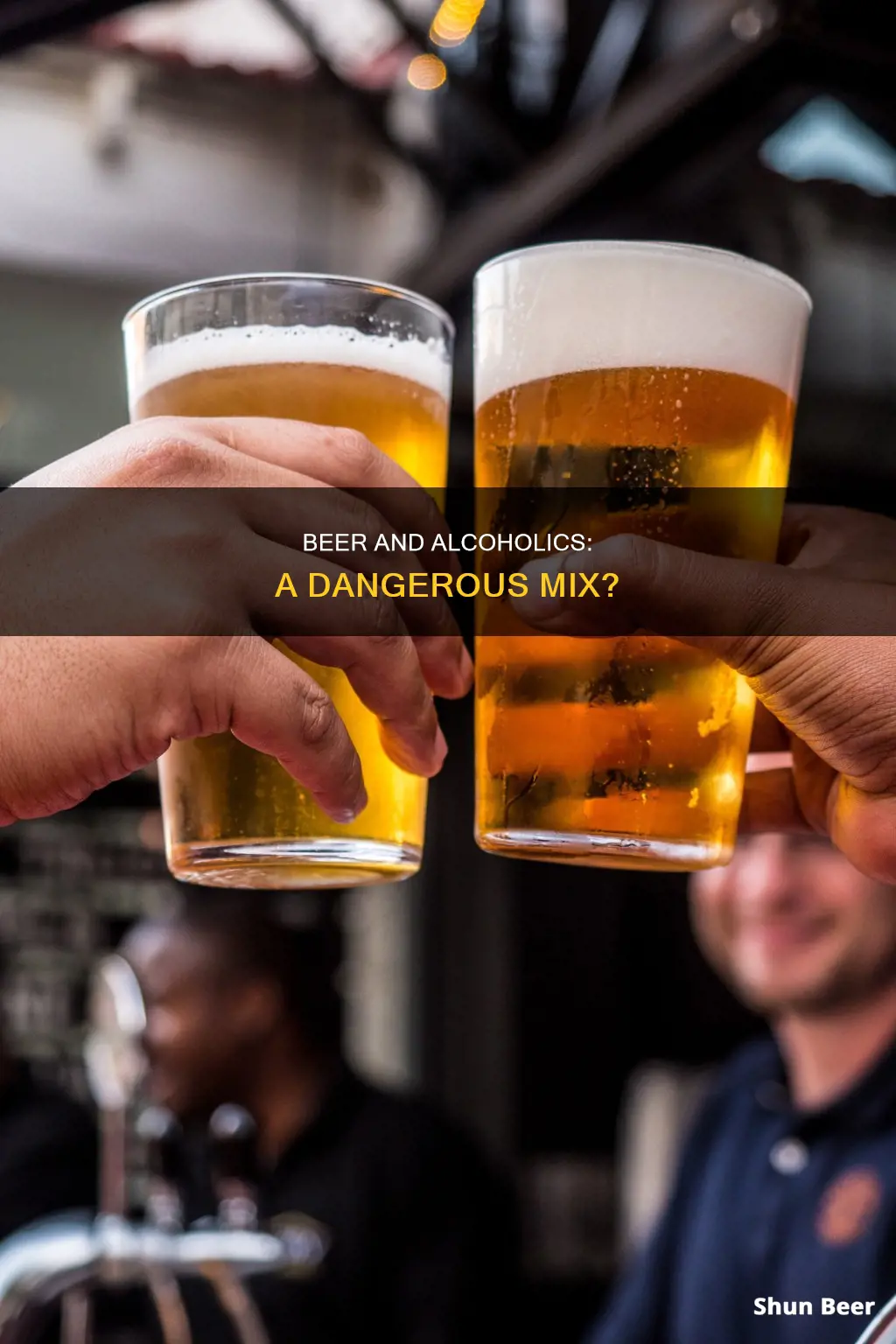
Alcoholism, or alcohol use disorder (AUD), is characterised by a craving for alcohol that cannot be controlled, and withdrawal symptoms when without it. Beer is a popular alcoholic drink, but it is a misconception that beer drinkers are less likely to become alcoholics than other types of drinkers. Beer contains alcohol, and those who abuse it will develop problems.
Non-alcoholic beer has gained popularity in recent years, with sales surging by over 37% in the US in 2020. However, non-alcoholic beer is not necessarily risk-free for recovering alcoholics. Many non-alcoholic beers still contain trace amounts of alcohol, and the smell and taste may be enough to trigger a relapse in some individuals.
So, should alcoholics drink non-alcoholic beer? The general consensus is that it can pose a considerable risk, but there is no black-and-white answer. Each person must evaluate their situation to determine if the benefits of non-alcoholic beer outweigh the risks.
| Characteristics | Values |
|---|---|
| Alcoholic stereotype | Homelessness, unhealthy appearance, tragic life, drunkenness, loneliness, violent behaviour, unemployment, unreliable, lack of morals |
| Reality of alcoholics | Functional in society, successful in their career, able to hide their drinking problem, non-aggressive, wealthy, respected in the community |
| Dangers of beer drinking | Excessive calorie consumption, low nutritional value, slower intoxication, normalisation of drinking culture, trigger for recovering alcoholics, potential for binge drinking |
| Pros of non-alcoholic beer | Social inclusion, healthier alternative, reduced risk of intoxication, aids relaxation |
| Cons of non-alcoholic beer | Contains trace amounts of alcohol, can trigger relapse, normalises drinking, may lead to increased alcohol consumption |
What You'll Learn

The dangers of non-alcoholic beer
Non-alcoholic beer is often marketed as a healthier alternative to regular beer, but it is important to be aware of the potential dangers associated with its consumption. Here are some of the risks to consider:
Risk of Relapse for Recovering Alcoholics
The taste, smell, and appearance of non-alcoholic beer can trigger cravings and lead to a relapse for individuals recovering from alcohol addiction. The small amount of alcohol in non-alcoholic beer can activate cravings and contribute to a full-blown relapse. It is recommended that recovering alcoholics avoid non-alcoholic beer entirely to prevent any potential risks.
Negative Health Effects
Despite being marketed as a healthier alternative, non-alcoholic beer can still have negative effects on health. The small amount of alcohol in non-alcoholic beer can lead to dehydration, contribute to an increased risk of developing certain types of cancer, and provide empty calories, which can lead to weight gain and associated health issues such as diabetes and heart disease.
Misleading Marketing
Some non-alcoholic beers are marketed as completely alcohol-free, which can be misleading for individuals trying to avoid alcohol. This can lead to unintended consumption of alcohol and pose risks for those with certain health conditions or taking medications that interact with alcohol. It is important to check the labels and be aware that non-alcoholic beer can contain up to 0.5% alcohol by volume.
Risk of Intoxication and Impaired Driving
While the amount of alcohol in non-alcoholic beer is low, it can still lead to intoxication, especially in individuals who are sensitive to alcohol or have a low tolerance. This can impair judgment and coordination, increasing the risk of accidents when operating machinery or driving. In some countries, consuming non-alcoholic beer before driving may still be considered a DUI offense.
Potential Health Risks
Some studies have found that non-alcoholic beer can have negative effects on the body, including increased levels of uric acid, which is a risk factor for gout. It can also cause inflammation, adversely affect digestion and gut health, and interact with certain medications. Even though the alcohol content is low, it is not completely absent, and individuals who are sensitive or allergic to alcohol may experience adverse reactions such as headaches, nausea, and dizziness.
Dangers During Pregnancy
Pregnant women are advised to avoid consuming any amount of alcohol, including non-alcoholic beer, as it can have harmful effects on the developing fetus. Studies have shown that even small amounts of alcohol consumption during pregnancy can increase the risk of fetal alcohol spectrum disorders and other developmental issues. Therefore, it is best for pregnant women to completely abstain from consuming non-alcoholic beer.
Big Beer Mugs: How to Drink Them?
You may want to see also

Beer as a trigger for alcoholics
Beer can be a trigger for alcoholics in recovery, even if it is non-alcoholic. The smell, taste, and appearance of beer can be enough to trigger cravings and a subsequent relapse. The sound of opening a can, the malty aroma, or the feel of a condensation-covered glass can stimulate the reward centres of the brain to release dopamine, triggering a craving for alcohol.
Research has shown that the craving for alcohol increases after consuming non-alcoholic beer, and this increase correlates with the severity of alcohol dependence. In some cases, non-alcoholic beer has been shown to produce a "placebo effect" of intoxication, causing a dangerous craving for more.
Additionally, non-alcoholic beer may still contain small amounts of alcohol. According to US law, non-alcoholic beer can contain up to 0.5% alcohol by volume (ABV). This means that a person would have to drink ten non-alcoholic beers to reach the same blood alcohol level as one regular beer. However, research has found that many non-alcoholic beers contain more alcohol than their labels indicate.
For these reasons, it is generally recommended that alcoholics in recovery avoid non-alcoholic beer and anything that smells like alcohol. While it may be a valuable alternative for those looking to moderate their alcohol intake, it can also be a dangerous loophole for those not serious about their sobriety. The decision to consume non-alcoholic beer during recovery is a personal one and should be evaluated based on the individual's situation and triggers.
A Day at the Beer Hall: A Beginner's Guide
You may want to see also

The pros and cons of non-alcoholic beer
Pros of Non-Alcoholic Beer
- Social Inclusion: Non-alcoholic beer allows recovering alcoholics to feel included in social situations where drinking is prevalent, such as parties, picnics, and sporting events. It helps them fit in and feel like part of the group without compromising their sobriety.
- Taste and Sensory Experience: Many non-alcoholic beers have improved in taste and now rival their alcoholic counterparts. They can be paired with food and enjoyed like regular beer, providing a similar sensory experience without the negative consequences of alcohol.
- Health Benefits: Non-alcoholic beers have several health benefits due to their low alcohol content. They are associated with a reduced risk of heart disease, improved sleep, aid in bone growth, and a stronger immune system. They are also rich in vitamins and minerals, including folic acid, potassium, iron, and zinc.
- Calorie Reduction: Non-alcoholic beers typically contain fewer calories than regular beer. By switching to non-alcoholic options, individuals can reduce their intake of "empty" calories from alcohol, which provide no nutritional value.
- No Intoxication: Non-alcoholic beers, with an alcohol content of up to 0.5%, will not get individuals drunk. This means no more hangovers, impaired productivity, or negative social consequences associated with drunkenness.
- Transparency of Ingredients: Unlike alcoholic beverages, non-alcoholic beers are required to list their ingredients on the packaging. This transparency allows consumers to make informed choices and know exactly what they are consuming.
- Cost-Effectiveness: In some countries, non-alcoholic beers are taxed less than their alcoholic counterparts, making them a more cost-effective option for consumers.
- Support for the Beer Industry and Pubs: By consuming non-alcoholic beer, individuals can continue to support the beer industry and pubs without contributing to alcohol-related harm.
- Relaxation and Stress Relief: Non-alcoholic beer can provide a way to unwind and relax after a stressful day, similar to how some people use alcohol, without compromising recovery.
Cons of Non-Alcoholic Beer
- Risk of Relapse: The biggest concern with non-alcoholic beer is the risk of triggering a relapse in recovering alcoholics. The smell, taste, and sensory cues of non-alcoholic beer can stimulate the reward centres of the brain, releasing dopamine and triggering cravings for alcohol.
- Misleading Labeling: Studies have found that some non-alcoholic beers contain higher levels of alcohol than declared on their labels. This can be dangerous for individuals in recovery who are avoiding alcohol entirely.
- Hypersensitivity to Alcohol-Related Cues: For some recovering alcoholics, any sensory cues associated with alcohol can be a catalyst for a relapse. The sound of opening a can, the smell of malt, or the feel of a cold glass can stimulate the brain and lead to a devastating relapse.
- Euphoric Recall: Indulging in non-alcoholic beer can trigger euphoric recall, where individuals romanticize their previous drinking experiences and downplay the negative consequences. This can weaken their commitment to sobriety and lead to a false sense of control over their drinking.
- Maintaining a Recovery-Focused Lifestyle: Participating in social events where alcohol is present and consuming non-alcoholic beer may not align with a genuine recovery lifestyle. Lasting sobriety often requires changing environments and associating with people who support abstinence.
- Vulnerability to Addiction: Recovered addicts remain vulnerable to alcohol addiction for life. Consuming non-alcoholic beer can be like playing with fire, as it may lead to a slippery slope back into drinking alcoholic beverages.
- Placebo Effect of Intoxication: Some individuals have reported experiencing a "placebo effect" of intoxication after drinking non-alcoholic beer. This sensation can trigger cravings and lead to a desire for more intense effects.
In conclusion, while non-alcoholic beer offers several benefits, it is essential to weigh these against the potential risks, especially for individuals in recovery from alcoholism. Each person must evaluate their situation and determine whether the benefits outweigh the risks of triggering a relapse.
Beer Drinking: Is Daily Consumption Really That Bad?
You may want to see also

Stereotypes of alcoholics
- Homelessness or lack of stable housing: This stereotype suggests that alcoholics are unable to maintain a home or experience homelessness due to their drinking. While it is true that alcoholism can lead to financial difficulties and housing instability, not all alcoholics are homeless or unable to maintain housing.
- Unhealthy appearance: The stereotype of an alcoholic often includes a puffy face, a red nose, or other signs of ill health. While alcohol abuse can certainly take a toll on one's physical appearance, not all alcoholics exhibit these specific traits.
- Tragic and depressing life: The media often portrays alcoholics as having depressing and unfulfilling lives, with no friends or family and no success in their career. However, alcoholics can come from all walks of life and may have supportive families, meaningful careers, and healthy social lives.
- Violent and angry behaviour: This stereotype associates alcoholics with physical violence and a tendency towards anger. While alcohol can lower inhibitions and increase the risk of aggressive behaviour, not all alcoholics exhibit violent tendencies.
- Lack of control: Stereotypes often depict alcoholics as lacking control over their lives and unable to stop drinking. While alcoholism does involve a loss of control over alcohol consumption, this does not always extend to other areas of an alcoholic's life.
- Lower socioeconomic status: There is a common perception that alcoholics are from lower socioeconomic classes. However, alcoholism can affect people of all socioeconomic backgrounds.
- Poor hygiene and dishevelled appearance: This stereotype involves the assumption that alcoholics are dishevelled, unkempt, and have poor personal hygiene. While alcohol abuse can lead to neglect of personal care, it is not true for all alcoholics.
- Gender stereotypes: Historically, alcoholism was more commonly associated with men. However, gender stereotypes surrounding alcohol consumption are changing, and women are increasingly affected by alcohol-related problems.
These stereotypes can be harmful as they may prevent people from recognizing alcohol-related problems in themselves or others. It's important to remember that alcoholism can affect anyone, regardless of their social status, appearance, or other factors.
Drinking Six to Eight Beers Daily: Is It Safe?
You may want to see also

The social benefits of non-alcoholic beer
Non-alcoholic beer also has a range of health benefits, which can improve the drinker's overall well-being and quality of life. For example, it is a good source of essential vitamins, minerals, fibre, and antioxidants, including B vitamins, calcium, potassium, zinc, selenium, and iron. It is also lower in calories than alcoholic beer, so drinkers don't need to worry about their caloric intake.
In addition, non-alcoholic beer can improve sleep quality and reduce stress and anxiety. This is due to the compounds xanthohumol and myrcenol in hops, which have a sedative effect and can increase the activity of the neurotransmitter gamma-aminobutyric acid (GABA). Improved sleep and reduced stress can have a positive impact on social interactions, as individuals are more likely to be patient, relaxed, and better able to communicate effectively.
Furthermore, non-alcoholic beer can promote post-exercise recovery and improve cardiovascular health. It contains sodium, fluids, and carbohydrates, which aid the body's recuperation after strenuous exercise. The polyphenols in non-alcoholic beer, such as polyphenol xanthohumol, can also help to reduce blood pressure, inflammation, and homocysteine levels, thereby reducing the risk of cardiovascular disease.
However, it is important to note that non-alcoholic beer may not be suitable for everyone, especially those with a history of alcohol use disorder. The smell and taste of non-alcoholic beer may trigger cravings and a subsequent relapse among individuals with alcohol use disorder. Therefore, it is crucial for individuals to assess their own situation and decide whether the benefits of non-alcoholic beer outweigh the potential risks.
Beer and Bowel: Friend or Foe?
You may want to see also







